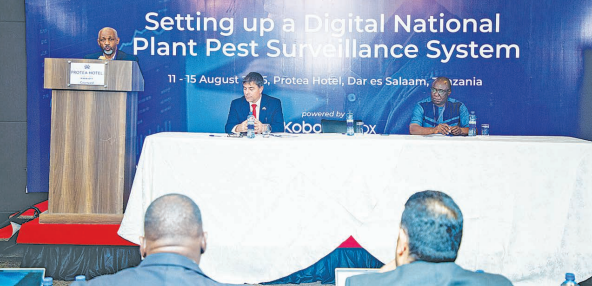Regional workshop fuels digital plant health

TANZANIA: STRENGTHENING Plant Health Services in Tanzania for Enhanced For Safety (STREPHIT) project is emerging as a cornerstone in modernising the country’s plant health systems and boosting agricultural trade across the Southern African region.
Funded by the European Union with contributions from the Food and Agriculture Organisation of the United Nations (FAO) and the Government of Tanzania, STREPHIT addresses both technical and administrative gaps that have historically hindered effective pest surveillance, disease control and compliance with international trade standards.
With an investment of approximately €10 million equivalent to 28.3bn/- from the EU, supplemented by €350,000 equivalent to 990.5m/- rom FAO and €250,000 equivalent to 707.5m/- from the Tanzanian government, the four-year project is designed to enhance the capacity of plant protection authorities, improve food safety and strengthen export competitiveness.
It supports the Agenda 10/30 development vision, which seeks to increase agricultural GDP by 10 per cent by 2030 through prioritising key crops, adopting modern technology and fostering inclusive participation of women and youth in agriculture.
At its core, STREPHIT aims to protect Tanzania’s agricultural economy and biodiversity by introducing advanced pest detection systems, upgrading laboratories, training plant health officers and promoting regional and global data integration.
FAO notes that plant pests and diseases are responsible for losses of up to 40 per cent of global crop production annually, costing the world economy more than 220 billion US dollars.
In sub-Saharan Africa, these challenges are compounded by limited technical capacity, fragmented surveillance systems and restricted access to international markets due to phytosanitary non-compliance.
By closing these gaps, STREPHIT not only safeguards food security but also opens opportunities for agricultural exports and rural development.
As part of its implementation strategy, STREPHIT facilitated a regional workshop from 11 to 15 August in Dar es Salaam to support the digital transformation of plant pest surveillance across Southern Africa.
The event brought together experts from National Plant Protection Organisations (NPPOs) of SADC member states to exchange knowledge and align on best practices.
During the workshop, the assistant to the FAO Representative in Tanzania, Mr Chales Tulahi, underlined the broader benefits of this regional collaboration.
“This workshop is more than a training, it is a platform for knowledge exchange, regional integration and global alignment. The skills and systems we build here will empower NPPOs to implement international standards with precision and confidence,” said Mr Tulahi.
On his part, the Principal Secretary of the Ministry of Agriculture, Irrigation, Natural Resources and Livestock in Zanzibar, Ali Kamis Juma, called the digital model “a game-changer” that offers a unified approach to protecting both agricultural economies and biodiversity across the region.
Deputy Permanent Secretary in Tanzania’s Ministry of Agriculture, Dr Stephen Nindi, stressed that the initiative aligns with the country’s long-term vision. “By integrating digital tools into pest surveillance, we are not only improving data quality but also empowering our institutions to respond swiftly and effectively to emerging threats,” Dr Nindi said.
The Head of Cooperation at the European Union Delegation to Tanzania, Mr Marc Stalmans, said the EU is proud to support such innovation, noting that it “reflects the kind of regional cooperation that will drive sustainable development across Africa.”
Beyond the workshop, STREPHIT’s third steering committee meeting, held earlier this year in Dodoma, reviewed progress and set strategic directions, including integrating pest surveillance into Tanzania’s eKilimo agricultural information platform.
Stakeholders also endorsed recommendations to ensure the project’s sustainability beyond its current funding cycle.
The integration of digital surveillance systems is expected to bring far-reaching benefits: Earlier pest detection, more targeted interventions, reduced pesticide misuse and enhanced compliance with international export requirements.
As FAO points out, robust surveillance systems are a frontline defence against invasive species such as the fall armyworm and desert locust, that can devastate crops and livelihoods if not managed promptly.
By coupling technology with regional cooperation, Tanzania and its SADC partners are building a resilient agricultural future.
The STREPHIT initiative, with its strong blend of innovation, capacity building and policy alignment, is positioning the country as a leader in plant health management and a model for the continent.
Since its launch, STREPHIT has made significant strides in strengthening Tanzania’s plant health systems. One of its key achievements has been in capacity building and the adoption of modern tools.
Plant health inspectors and field surveillance teams have received specialised training in modern sampling techniques, the use of GPSenabled devices and digital reporting systems. These skills enable them to detect, monitor and respond to pest threats with greater speed, accuracy and efficiency, improving the country’s overall preparedness against agricultural pests and diseases.
The project has also invested heavily in upgraded infrastructure to support its operations. This includes the handover of surveillance drones, ICT equipment, advanced laboratory instruments, vehicles and motorbikes to the Tanzania Plant Health and Pesticides Authority (TPHPA) on the mainland and the Plant Protection Division in Zanzibar.
ALSO READ: Tanzania marks Plant Health Day, urges stronger protections
These resources have significantly expanded the reach and operational capacity of the institutions responsible for plant health management, ensuring they can conduct surveillance and inspections across wider and more remote areas.
In addition, STREPHIT has prioritised improvements at border posts, where the rehabilitation of mini-laboratories is currently underway. These facilities will allow for real-time testing of plant and crop samples at points of entry, reducing delays in clearance procedures for agricultural exports and ensuring that only safe, pestfree produce enters or leaves the country. This effort is critical for protecting local agriculture while facilitating smoother trade flows.
Another important milestone is in regional and international data sharing. The project is working towards integrating Tanzania’s pest surveillance data with FAO’s global platforms.
This move will enhance international decision-making, strengthen cross-border collaboration and ensure Tanzania’s compliance with International Standards for Phytosanitary Measures (ISPMs) such as ISPM 4, 6 and 10.
By connecting to global networks, the country can better anticipate and respond to pest outbreaks while contributing valuable information to regional and international plant health initiatives.





